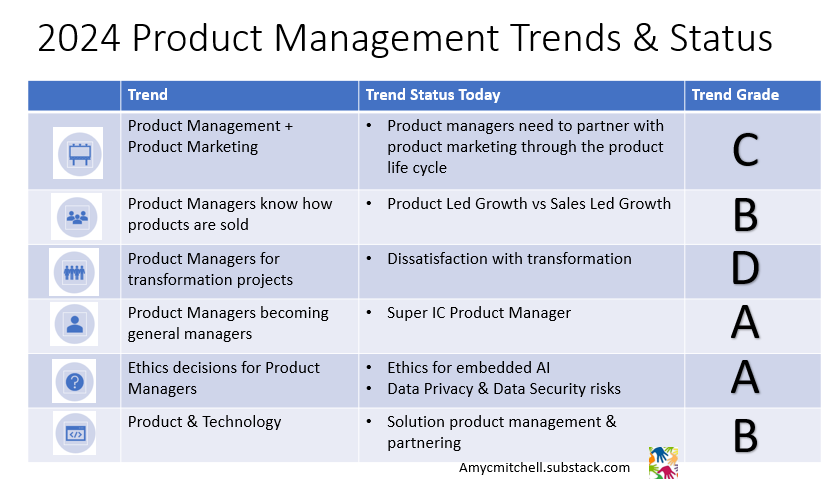It’s the time of the year to comment on trends in product management. This week's newsletter covers:
Product Management Trends for 2025
A look back at the 2024 trends from a year ago
2025 Product Management Trends
1. Collaboration as a Differentiator in an AI-Powered World
Today, every product manager is equipped with AI tools that enhance their work:
Powering product management tools
Writing and editing documents
Automating workflows and processes
Delivering market insights
The downside is AI has limitations. It can mislead, overlook mistakes, and provide only positive feedback.
The product manager's edge lies in collaboration. Working cross-functionally, collaborative product managers provide insights that AI isn't ready to deliver yet. For example, product managers are key to preparing their products for AI features.
Average product managers know how to use AI, and exceptional product managers know how to collaborate cross-functionally.
2. Partnering with Product Marketing: The Key to Delivering Customization and Personalization
The trickle of customization and personalization requests will grow throughout the year. As product environments become more complex, busy customers can quickly accommodate the customization of established solutions.
Customers have less time to integrate product updates into their workflows. Every component of a customer’s solution must work together seamlessly to fit into their environment, creating a frictionless experience.
As customization increases, the partnership between product managers and product marketing is key to segmenting complex installed base customers into meaningful personas. Without this partnership, every customer becomes a snowflake customer with unrepeatable customizations.
The relationship between product marketing, sales, and product managers is crucial to anticipate and handle evolving customer needs.
3. Partnerships and Solutions: Enabling Multi-Ecosystem Success
As customers increasingly depend on ecosystems to deliver solutions for their employees and users, supply chain issues, regulatory shifts, licensing changes, and outages are pushing customers to use multiple ecosystems.
While most customers maintain a primary ecosystem, diversifying their environments has become a critical focus. To unlock customer budgets and drive long-term value, product managers must bring technical expertise and strategic consulting skills to help customers make sound investment decisions.
Product managers are key to setting up partnerships and solutions that enable multiple ecosystems. By bridging the gap between technology and business needs, they help customers navigate multi-ecosystems.
Successful product managers collaborate with product marketing and sales teams to leverage the partnerships and solutions that meet their customers' needs.
4. Ethical Decisions: Expanding for Product Managers
The ethical challenges facing product managers are expanding, requiring careful navigation and thoughtful decision-making. Key areas demanding attention include:
Data privacy regulations: With emerging AI data usage ethics and evolving privacy laws, continuous diligence is essential.
Product security: Regular vulnerability assessments and staying aligned with best practices are non-negotiable.
Accessibility: Delivering inclusive customer experiences that are easy for everyone to use is now a baseline expectation.
Environmental and sustainability: Investor and stakeholder demands for progress tracking are becoming integral to product roadmaps.
Balancing the competing priorities of AI, data privacy, and shifting regulations requires both technical expertise and business savvy. Product managers must evaluate risks, make tough tradeoffs, and communicate the implications.
By aligning business goals with ethical practices, product managers lead the way in building trust and delivering responsible innovation.
5. The Rise of Virtual Teams: Product Managers Are Essential Leaders
Virtual teams have long been part of the workplace. With shrinking numbers of managers, the remaining leaders need product managers to lead complex initiatives. Initiatives that once were driven by a director or VP are now handled by product managers with virtual teams. Product teams, too, are becoming more dynamic, often assembling rapidly to address specific goals or experiments before disbanding.
The surge in product experimentation further drives the need for virtual teams. These teams tackle short-term projects that test ideas, explore market opportunities, or validate concepts. Product managers play a crucial role in these efforts, ensuring stakeholder alignment, providing business justification, and delivering accurate forecasts.
By bridging business strategy and technology execution, product managers are uniquely positioned to lead virtual teams.
A Look Back at Last Year's Trends
How did last year's trends play out in 2024? Here are the predicted trends from January 2024:
And here is the status today. Trend grading scale:
A = The trend grew in 2024
B = Minimal change in the trend in 2024
C = The trend fizzled out or changed in 2024
D = The trend is no longer considered
Good calls:
Product managers becoming general managers
Ethics decisions need product managers
OK calls:
Product managers know how products are sold
Merging of product and technology
Misses:
Blurring of product management and product marketing roles
Transformation projects
Conclusion - Product Management Keeps Evolving
AI is continuing to influence the role of product management. While AI speeds up the product lifecycle, product managers need to allocate time to evaluate the impacts of AI through collaboration. Additionally, product managers are filling the role of product thought leaders to protect and scale their products.
How will these 5 product management trends play out this year?
TLDR Product listed Product Management IRL articles recently! This biweekly email provides a consolidated email of recent product management articles.
Last week’s backstory for paid subscribers was about defining your product borders. Getting to Common Ground on Solution Product Management
Connect with Amy on LinkedIn, Threads, Instagram, and Bluesky.









While AI forecasts trends and automates tasks, it’s the human touch that brings synergy across silos.
Collaboration transforms technical features into meaningful customer experiences.
Thanks Amy. Happy New Year!